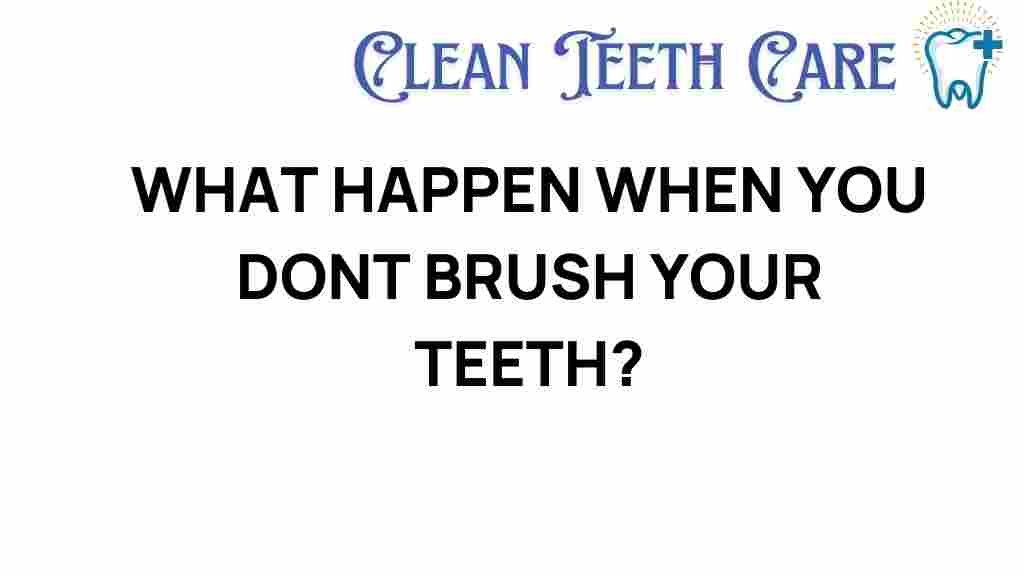The Consequences of Neglecting Your Oral Hygiene
Oral hygiene plays a crucial role in maintaining overall dental health. When you neglect your oral hygiene, you open the door to various dental issues that can have lasting consequences. Understanding what happens when you don’t brush your teeth is essential for preventing serious health problems. In this article, we will explore the impacts of poor oral hygiene, including plaque buildup, cavities, gum disease, bad breath, and teeth decay.
Understanding Oral Hygiene
Oral hygiene refers to the practice of keeping your mouth, teeth, and gums clean and healthy. It involves regular brushing, flossing, and dental check-ups. Poor oral hygiene can lead to a multitude of dental issues, making it vital to maintain good habits.
The Importance of Brushing Your Teeth
Brushing your teeth is the first line of defense against plaque buildup. When you don’t brush, bacteria accumulate on your teeth, leading to numerous problems. Here are some key reasons why brushing is essential:
- Removes food particles and plaque.
- Prevents cavities and tooth decay.
- Reduces the risk of gum disease.
- Freshens breath.
What Happens When You Don’t Brush Your Teeth?
Neglecting your oral hygiene has several immediate and long-term consequences. Let’s delve into the various issues that arise from not brushing your teeth regularly.
Plaque Buildup
Plaque is a sticky film of bacteria that forms on your teeth. When you skip brushing, plaque can harden into tartar, making it much more difficult to remove. Here’s what happens:
- Increased Bacterial Growth: Without brushing, bacteria thrive, leading to increased plaque formation.
- Tartar Formation: Plaque that isn’t removed can calcify into tartar, which requires professional cleaning to remove.
Cavities
Cavities are one of the most common consequences of poor oral hygiene. When plaque is not removed, it produces acids that erode tooth enamel, leading to decay. Here’s how cavities develop:
- Acid Production: Bacteria in plaque feed on sugars and produce acids.
- Enamel Erosion: The acids dissolve the enamel, creating holes in the teeth.
- Progression of Decay: If not treated, cavities can reach the inner layers of the tooth, causing severe pain and infection.
Gum Disease
Gum disease, or periodontal disease, is another severe consequence of neglecting oral hygiene. It begins with gingivitis and can progress to more serious stages:
- Gingivitis: Inflammation of the gums, characterized by redness, swelling, and bleeding.
- Periodontitis: Advanced gum disease that can lead to tooth loss and bone damage.
Regular brushing helps to prevent gum disease by removing plaque and bacteria from the gum line.
Bad Breath
Bad breath, or halitosis, can be a significant social concern. It often results from poor oral hygiene:
- Bacterial Accumulation: Bacteria in the mouth produce foul-smelling compounds.
- Food Particles: Food left between teeth can rot and contribute to bad breath.
Maintaining good oral hygiene is essential to combat bad breath and keep your breath fresh.
Teeth Decay
Teeth decay is a progressive condition that can lead to severe dental problems. The process begins with the breakdown of enamel and can result in:
- Tooth Sensitivity: Decay can lead to sensitivity to hot, cold, or sweet foods.
- Pain and Discomfort: Advanced decay can cause significant pain, requiring dental intervention.
- Tooth Loss: Severe decay can eventually lead to the loss of teeth.
Step-by-Step Process for Maintaining Oral Hygiene
To avoid the consequences of neglecting your oral hygiene, follow these steps:
1. Brush Your Teeth Twice Daily
Use fluoride toothpaste and a soft-bristled toothbrush. Brush for at least two minutes each time, ensuring you cover all surfaces of your teeth.
2. Floss Daily
Flossing helps remove food particles and plaque from between your teeth, areas that your toothbrush may miss.
3. Rinse with Mouthwash
Using an antibacterial mouthwash can help reduce plaque and prevent gum disease. Look for products that contain fluoride.
4. Maintain a Healthy Diet
Limit sugary snacks and beverages, as sugar contributes to plaque buildup and cavities. Incorporate fruits, vegetables, and dairy into your diet for healthier teeth.
5. Regular Dental Check-ups
Visit your dentist at least twice a year for professional cleanings and check-ups. This ensures any potential issues are addressed promptly.
Troubleshooting Tips for Common Oral Hygiene Issues
If you’re facing challenges with your oral hygiene routine, consider these troubleshooting tips:
Difficulty Brushing for Two Minutes
- Use a Timer: Set a timer to ensure you brush for a full two minutes.
- Break It Down: Brush for 30 seconds in each quadrant of your mouth.
Bleeding Gums
- Gentle Brushing: Ensure you’re using a soft-bristled toothbrush and not applying too much pressure.
- Consult Your Dentist: If bleeding persists, consult your dentist, as it may indicate gum disease.
Persistent Bad Breath
- Check for Food Traps: Make sure you’re flossing to remove food particles.
- Stay Hydrated: Drink plenty of water to help wash away food particles and bacteria.
For additional information on maintaining oral hygiene, check out this resource.
Conclusion
Neglecting your oral hygiene can lead to severe consequences, including plaque buildup, cavities, gum disease, bad breath, and teeth decay. By understanding the importance of maintaining good oral hygiene and implementing effective practices, you can ensure a healthier mouth and a brighter smile. Remember, regular brushing, flossing, and dental visits are critical to preserving your dental health. Don’t wait until it’s too late—start prioritizing your oral hygiene today!
For more tips on dental health, visit this page.
This article is in the category Hygiene and created by CleanTeethCare Team
